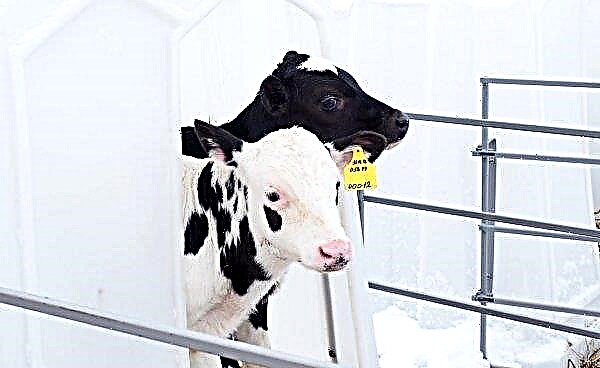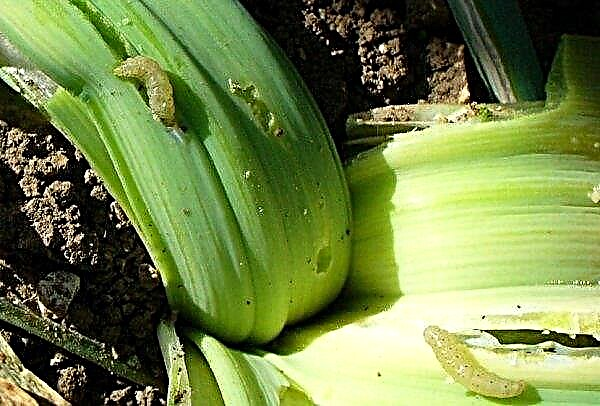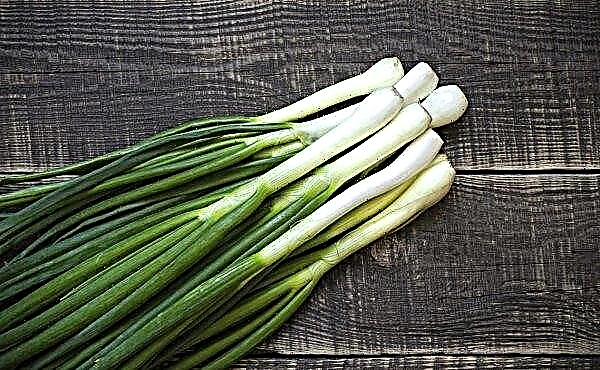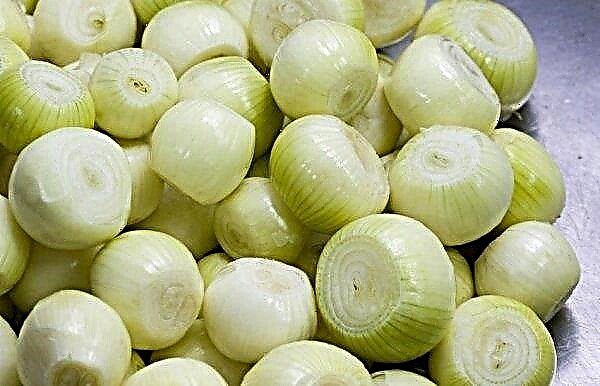There are chicken eggs in almost every refrigerator. They are a popular product and an important ingredient in many dishes. We will learn how to save chicken eggs for a long time, shelf life for them and for birds laid by other birds, how to determine their freshness.
What affects egg storage time
Eggs of chickens can be successfully stored for a long period, but various factors affect their safety:
- place of origin. The product from the poultry farm is stored for up to a month, and the home product lasts longer - up to three months, if they were received in proper conditions;
- temperature. In indoor conditions, this product is stored less than in the refrigerator, and the heat affects their preservation very negatively;
- humidity. Optimally, if the humidity does not exceed 85%. Dampness impairs storage;
- readiness degree. A cooked product is stored much less raw;
- shell thickness. Thick eggshell contributes to better preservation of contents;
- purity. On a cleaner shell there are fewer harmful bacteria. Washing chicken eggs clogs breathing pores, which reduces storage time by almost half;
- lighting. In places of storage there should be no sunshine reducing the shelf life;
- position. Point-down storage contributes to the safety of the product, since the blunt part with an oxygen-saturated air chamber is at the top;
- integrity. The shell is the best storage capacity. If it is cracked, then bacteria enter through the damage, and shelf life is drastically reduced. You should refrain from buying such a product, and if you damaged the shell yourself, then use it quickly. Cracked or peeled egg is also stored less - it should be used in the next 2-3 days.

Important! If you accidentally beat an egg, then it should be washed with running water, poured into a clean container with a lid, slightly salted and refrigerated. Its shelf life will be no more than two days, but it is best to use it on the next day, and cook it by heat treatment. Indoor his should be used on the same day, optimally - in the first 6 hours.
How much and how to store chicken eggs
For storage, it is best to use a refrigerator or a cellar, and in their absence, you can use some tricks.
In fridge
A great place to save is at the wall or near the freezer. In this case, it will be correct to use egg trays made of cardboard or plastic.
Consider a table of storage of eggs of different readiness for days.
| Raw | |
| 1–4 ° C | 90 |
| 5–10 ° C | 35 |
| -1 ° C | 120 |
| Boiled | |
| Hard boiled | 7 |
| In the "pouch" | 2–3 |
| Soft-boiled | 1–2 |
Important! Easter eggs stained with food or natural dyes are stored as usual. But the use of thermal film for decoration shortens the shelf life for food, because it closes the pores of the shell. A product with this decor should be eaten in the next 4-5 days.
At room temperature
In indoor conditions, the season (summer or winter) should be taken into account. You need to find a cool place that is not heated by the sun and with good ventilation (for example, a basement, pantry). At a temperature of not more than +20 ° C, raw chicken eggs are stored for up to three weeks. Exceeding the storage temperature above +25 ° C is highly undesirable.
For better safety, they are recommended to be placed in wooden boxes filled with sand, salt, sawdust and wrapped with a cloth. It’s good to use such a trick - to immerse in a saline solution made at the rate of 20 g per 1 liter of water. He will be able to preserve eggs for up to 4 weeks. A cooked product in room conditions is stored for no more than a day.
A cooked product in room conditions is stored for no more than a day.
How to check eggs for freshness
To find out their freshness, you need to pay attention to the following:
- surface. A good product has a matte finish, while a stale one gives gloss. But sometimes before selling the testes are washed (which also reduces the shelf life in the refrigerator), and this affects the quality of the surface, so this method of determination is not always applicable;
- need to compare external data. If the specimens differ by eye, it is likely that they were added to the fresh ones already in storage;
- shake. If something hangs inside this product, then it is spoiled, because with long storage the shell inside dries out and begins to lag behind the shell;
- immerse in a solution with a high concentration of salt. If the checked copy has fallen to the bottom and lies, then it will not exceed 7 days. When a blunt tip comes up, and the other end is at the bottom, then it takes about 10 days. But if it floats in a liquid and protrudes about half, then the egg is definitely rotten;
- break the egg on the edge of the pan. In a specimen of good freshness, the protein is transparent, denser and has a higher viscosity than stale. It does not spread as fast on the bottom of the pan as less fresh. If, when broken, the yolk quickly spreads and mixes with protein, then this instance is probably not the first freshness;
- boiled eggs, when fresh, are poorly cleaned, since the film is tightly attached to the shell and the inside. But the long-stored product is quickly peeled off;
- shelf life. Look at the production date and expiration date printed on the packaging material.

Did you know? The color of the shell depends on the breed characteristics and appearance of the hen. If the chicken has a dark plumage, then the color of the shell is brown, and with light plumage it is white. There is a breed of chickens that carries a product with a blue shell (Araucana).
How many eggs of other birds can be stored
The safety of eggs of different birds is different. Turkey can be stored in the same way as chicken, but eggs from quail and guinea fowl last longer.
Their shelf life and under different conditions can be seen in the following table:
| Kind of eggs | In fridge | No refrigeration units | ||
| Recommended temperature and storage conditions | Storage time | How to store eggs. At what temperature | Storage time | |
| Quail | It is better to store closer to the freezer, where the temperature is +1 ... + 3 ° C in a special tray or in another container, the bottom of which is covered with a cloth. | Up to 2 months | In a cellar or pantry at a temperature of approximately +15 ° C and humidity up to 85% in a cardboard box, tray, basket, drawer and other containers, the bottom of which must be covered with natural fabric and wood sawdust. | Up to 1 month |
| Goose | 7-14 days | No more than 4 days | ||
| Ostrich | Up to 3 months | 1 month | ||
| Duck | 7-14 days | Up to 4 days | ||
| Turkey | No more than 21 days | Up to 14 days | ||
| Guinea fowl | On any shelf of the refrigerator, at a temperature in the range from 0 to +10 ° C, in a container. | Up to six months | 60 days | |
Chicken eggs should be stored in the refrigerator, but they are stored in the room for up to three weeks at a temperature of no more than + 25 ° C, away from the sun and damp. The cooked product is preserved significantly less, and the violation of the integrity of the shell reduces the time of use even more.Did you know? There are diet eggs that are marked with a red letter D and canteens (blue letter C). A diet is considered a product demolished no more than 7 days ago, and canteen - no more than 25 days.












